Dall’erranza epica alla migrazione etica. Il worlding della letteratura americana
DOI:
https://doi.org/10.53154/Oltreoceano8Keywords:
migration, translational American literature, world literatureAbstract
Questo saggio analizza il processo di worlding della letteratura americana, attualmente in atto, mettendo in luce come esso riscriva la migrazione che, da evento mitopoietico, funzionale alla definizione del carattere nazionale – come è stato dai Padri pellegrini al western fino alla letteratura etnica del Novecento – diventa occasione per un nuovo apprezzamento in senso etico delle globalità.
The Worlding of American Literature: From Mythic Wandering to Ethic Migration
This essay analyzes how the depiction of migration changes in some American texts of the 21th century, passing from the past epic dimension of the Pilgrim Fathers, the western or the ethnic narratives of the 20th century, to the ethic element of the so-called World Literature.
Downloads
References
Abani, C. (2014): The Secret History of Las Vegas. New York: Penguin.
Alvarez, J. (2010): How the Garcia Girls Lost Their Accents (1991). Chapel Hill: Algonquin Books.
Anaya, R. (1994). Bless Me, Ultima (1975). New York, Grand Central Publishing.
Antin, M. (1912): The Promised Land. Boston: Houghton Mifflin.
Antin, M. (1914): They Who Knock at Our Gates. Boston: Houghton Mifflin.
Bulawayo, N. (2013): We Need New Names. London: Vintage.
Cahan, A. (1985): Perduti in America. Trad. di M. Maffi. Milano: SugarCo.
Cahan, A. (1987): Lo sposo importato Trad. di M. Maffi.. Milano: Sugar-Co.
Cahan, A. (2019): L’ascesa di Levinsky. Trad. di L. Crescenzi &S. Zamagni. Fidenza: Mattioli.
Carpio, G. (2014): Contemporary American Immigrant Literature. RSA Journal, 23, pp. 54- 72.
Casanova, P. (2004): The World Republic of Letters. Cambridge and London: Harvard University Press.
Chandra, S. (2008): Re-Producing a Nationalist Literature in the Age of Globalization: Reading (Im)migration in Julia Alvarez’s How the Garcia Girls Lost their Accents. American Quarterly, 60, 3, pp. 829-850.
Cisneros, S. (2004): The House on Mango Street. London: Bloomsbury.
Concilio, C. (2018): We Need New Names by N. Bulawayo. Paradigms of Migration: The Flight and the Fall. Le simplegadi, 16, pp. 34-51.
Damrosh, D. (2003): What Is World Literature? Princeton and Oxford: Princeton University Press.
Danticat, E. (2000): The Farming of Bones. London: Abacus.
Deresiewicz, W. Fuku Americanus (2007/09/08): The Nation. Recuperato da https://www.thenation. com/article/archive/fukuacute-americanus/
Diaz, J. (2008): La breve favolosa vita di Oscar Wao. Trad. di Silvia Pareschi. Milano: Mondadori.
Dimock, W.C. (2007): Introduction: Planet and America: Set and Subset. In W.C. Dimock & L. Buell (Eds.), Shades of the Planet: American Literature as World Literature (pp. 1-16). Princeton: Princeton University Press.
Elias, A. J. & Moraru, C. (Eds.) (2015): The Planetary Turn: Relationality and Geoaesthetics in the Twenty-First Century. Evanston: Northwestern University Press.
Eggers, D. (2006): What Is the What. San Francisco: McSweeney’s.
Fante, J. (2005): The Brotherhood of the Grape. Edinburgh: Canongate.
Giles, P. (2007): The Deterritorialization of American Literature. In W. C. Dimock and Lawrence Buell (Eds.), Shades of the Planet: American Literature as World Literature (pp. 39-61). Princeton: Princeton University Press.
Goyal, Y. (2017): We Need New Diasporas. American Literary History, 29, 4, pp. 640-663.
Irr, C. (2014): The Geopolitical Novel: U. S. Fiction in the 21st Century. New York: Columbia University Press.
Irr, C. (2011): Toward the World Novel: Genre Shifts in 21st-Century Expatriate Fiction. American Literary History, 23, 3, pp. 660-679.
Lazarus, E. (1883): The New Colossus. Recuperato da https://www.poetryfoundation.org/poems/46550/the-new-colossus
Lopate, P. Immigrant Fiction: Exploring an American Identity. In The Gilder Lehrman Institute of American History. Recuperato da https://ap.gilderlehrman.org/history-by-era/literature-and-language-arts/essays/immigrant-fiction-exploring-american-identity
Núñez Cabeza de Vaca, A. (2001): La relación / The Account (1542). Houston: Arte Publico Press.
Robbins, B. (2011): The Worlding of the American Novel. In L. Cassuto, C. Virginia & B. Reiss (Eds.), The Cambridge History of the American Novel (pp. 1097-1107). Cambridge: Cambridge University Press.
Schultz, K. (2013/06/03): Review of Americanah by Chimamanda Ngozi Adichie. New York Magazine. Recuperato da https://www.vulture.com/2013/05/schulz-on-americanah-by-chimamanda-ngozi-adichie.html
Sollors, W. (1986): Beyond Ethnicity: Consent and Descent in American Literature. Oxford: Oxford University Press.
Yau, J. (1995): How to Become Chinese. in Yau, J. Hawaiian Cowboys (pp. 113-123). Santa Rosa (CA): Black Sparrow Press.
Yezierska, A. (2003): Bread Givers (1925). New York: Persea Books.
Yezierska, A. (1920): Hungry Hearts. Boston: Houghton Mifflin.
Yezierska, A. (1923): America and I. Recuperato da https://www.commonlit.org/texts/america-and-i
Downloads
Published
How to Cite
Issue
Section
License

This work is licensed under a Creative Commons Attribution-NonCommercial-ShareAlike 4.0 International License.
The authors undertake to comply with the following conditions, which are considered accepted at the time of submission of their contributions.
The sending of a text implies that it is unpublished and not submitted to be published elsewhere.
1. If accepted, the author shall confer on the publisher the right to publish and distribute it both in paper form and in the online electronic edition. The published articles will be downloadable and made available in open access.
2. Provided that it correctly indicates that the first publication took place in the journal Oltreoceano. Rivista sulle migrazioni the author has the right to: a) reproduce the article in separate extracts or collected in a volume; b) publish the article on their personal website or teaching site provided that these sites are of a non-commercial nature; c) deposit the article in online archives of a non-commercial nature, linked to the institution they belong to or as part of projects for the non-commercial dissemination and open access of scientific works.
The use of contributions by third parties, for commercial or otherwise unauthorized purposes, is not allowed. The publisher declines all responsibility for the unauthorized use of the material published in the journal.












